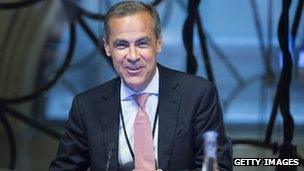The challenge ahead for Mark Carney
- Published
- comments

Some people seem to think Mr Carney can use some new tricks to strengthen the recovery.
The good news for Mark Carney is that the UK economy is looking healthier than when he was appointed at the end of last year.
If he's lucky, things will start to do better, without the new governor having to administer a miracle cure.
That would be good news indeed; not only does he not have any miracle cures at his disposal, but even the extra tricks that people do expect him to deploy are not very well understood.
Some people seem to think Mr Carney can use those new tricks to strengthen the recovery, while also doing a better job of meeting the inflation target. In reality, he's likely to have to choose between those two goals - at least in the short term. And he might not actually be able to deliver either of them.
"Forward guidance" is the big one: the City is expecting him to push for this inside the Bank, in the next few weeks, as the monetary policy team debates how to make the inflation target more growth-friendly, as the chancellor has requested.
In effect, forward guidance means promising not to change interest rates until Y. When Mark Carney did it in Canada in 2009, "Y" was a date - he promised not to raise rates for at least a year.
In the end, the economy recovered so quickly, he had to go back on his promise, and raise rates earlier than expected, though, in truth there had always been small print in there about inflation and developments in the economy.
Forward guidance
Since then, opinion has moved in the direction of "state-contingent" guidance: you don't say you will keep rates unchanged until a particular date, you say you will hold rates until unemployment has fallen to a certain rate, or maybe, until the economy has returned to where it was before the crisis.
There'll be plenty to say about this, if and when the Bank does go for some form of "forward guidance". But a few points to note now:
First, the critics of forward guidance, and there are plenty on the MPC, are right to say that the policy "ties" the central bank's hands. That's the point.
The theory behind forward guidance is fairly technical, but the basic idea is that you want to tie the central bank's hands because you want to convince the markets that the bank is really going to stick with the plan of boosting the real side of the economy, even when your normal policy rules might have suggested you start taking rates back up again.
If the markets and ordinary households all really believe this, they will act as if that recovery is going to happen, and so actually make it happen more quickly than it might have done otherwise.
Or that's the theory.
Is there room for this kind of guidance to make a positive difference in the UK? Many say there is more room now than there was two months ago.
Rising rates?
The ructions in the international financial markets over the US central bank's policy mean that long-term interest rates have risen by more than half a percentage point.
So, credit conditions have tightened a bit, without the Bank doing anything. The City is also now expecting UK official rates to rise in the second half of 2014. Surveys suggest that many consumers expect them to go up even sooner.
If Mark Carney and the rest of the MPC are keen to prevent long-term rates from rising any further, and/or do not now expect to raise bank rate until late 2015 or early 2016, it's possible that "guidance" to that effect could help change those things, in a useful direction.

Flexible on inflation?
But it's important to understand how this policy would work, if it worked at all. For any promise to affect the economy, it needs to change behaviour, by changing how people think the Bank will behave in the future.
Specifically, it needs to make people think the Bank is going to be more focussed on supporting growth than we previously thought, and more relaxed about inflation - at least over the next two or three years.
The bank needs to convince investors and ordinary punters that it will be even more "flexible" in his interpretation of the inflation target than Sir Mervyn King was. That might come as a shock to those who think the Bank has been plenty relaxed about inflation already.
Keeping promises
Of course, once growth does pick up, the Bank could go back on its promise, to keep a handle on inflation - or at least refer people to the small print, as Mark Carney did in Canada in 2010, when he raised interest rates sooner than he had previously "guided" the public to expect.
That's another curious thing about forward guidance: it's all about the central bank convincing the public that it means business, but the more successful it is in doing that, the more likely it is that the Bank will need to wriggle out of its perceived commitment.
The larger point is that forward guidance can make the trade-offs between the economy and inflation more explicit, and the likely policy response to them more nuanced. But it cannot make those trade-offs go away.
You can hope that Mark Carney will finally bring inflation down. Or you can hope that he will use forward guidance, or some other magic, to give extra support to the economy. But there are not any policy options on the table that will achieve both of those things - or at least, not without a lot of help from the economy itself.
Mark Carney needed to ask directions for the best exit at Bank tube station on Monday morning. No wonder - there are plenty to choose from. There aren't so many good ways out of this for the UK economy.